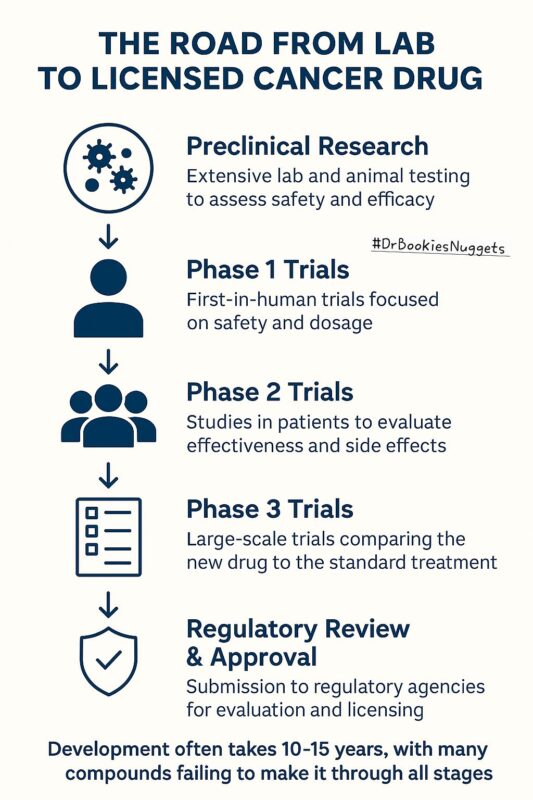Olubukola Ayodele, Breast Cancer Lead at University Hospitals of Leicester NHS Trust, shared on LinkedIn:
“Every so often, a headline grabs attention: ‘New Compound Shows Promise Against Cancer Cells!’
As a breast oncologist with a clinical fellowship in cancer drug development, I understand both the excitement these stories generate and also know how misleading they can be if taken at face value with it leading to frustration when years later, the treatment hasn’t materialized.
Here’s the reality: the journey from discovering an anticancer compound in the lab to actually having a licensed treatment is long, complex and uncertain.
A typical pathway looks like this:
- Preclinical Research:
This stage involves thorough testing in cell lines and animal models to assess safety and efficacy. It’s important to note that many compounds do not progress beyond this phase, but it is a vital starting point. - Phase 1 Trials (First-in-Human):
This marks the first time a drug is administered to humans, where the primary focus is on assessing safety and determining appropriate dosing levels. Many compounds find their journey halted here, but this early data is essential. - Phase 2 Trials:
At this stage, researchers evaluate the efficacy and side effects of the compound in a larger patient group, providing more insights into its potential. - Phase 3 Trials:
This phase compares the new treatment directly with the current standard of care in a diverse and extensive patient population, solidifying understanding of its effectiveness. - Regulatory Review and Approval:
If a compound successfully navigates these stages, it undergoes rigorous review by regulatory bodies like the MHRA, EMA or FDA before it can be licensed for use.
This entire process can take 10–15 years or more and success is never guaranteed. For every promising compound you read about, countless others quietly faded away, despite early promise.
Then Olubukola Ayodele added:
Why? Because what works in a lab doesn’t always translate to the complex, adaptive biology of humans.
Cancer is not a single disease but a vast collection of subtypes, each with its own behaviour and challenges. Tumours also evolve, resist treatment and interact dynamically with the body’s environment.
When a new compound shows activity in the lab, it’s exciting. But it’s the beginning of the story, not the end.
Why does this matter? Because:
- Patients and families deserve clarity. Hope is essential, but it must be grounded in reality.
- We must keep investing in translational research to bridge the gap between lab discoveries and real-world treatments.
- Media literacy is crucial. Not every ‘breakthrough’ headline means a new treatment is around the corner.
The work of researchers, clinicians, and trial participants worldwide is relentless and every discovery adds to our understanding. However, meaningful progress takes time, precision and patience.”

More posts featuring Olubukola Ayodele.


